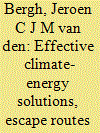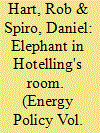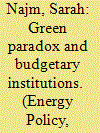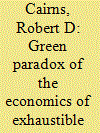|
|
|
Sort Order |
|
|
|
Items / Page
|
|
|
|
|
|
|
| Srl | Item |
| 1 |
ID:
112932


|
|
|
|
|
| Publication |
2012.
|
| Summary/Abstract |
Many well-intended climate-energy strategies are ineffective in the absence of serious environmental regulation. This holds, among others, for direct support of clean energy, voluntary energy conservation, technical standards on a limited set of products, unilateral stringent carbon pricing, and awaiting peak oil as a climate strategy. All of these suffer from "escape routes" that indirectly increase CO2 emissions and thus make the original strategy ineffective. On the other hand, environmental regulation alone may lead to a myopia-bias, stimulating early dominance of cost-effective technologies and a focus on incremental innovations associated with such technologies rather than on radical innovations. Although adopting a partial viewpoint keeps the analysis simple, we urgently need a more inclusive systems perspective on climate solutions. This will allow the formulation of an effective climate policy package that addresses the various escape routes.
|
|
|
|
|
|
|
|
|
|
|
|
|
|
|
|
| 2 |
ID:
110723


|
|
|
|
|
| Publication |
2011.
|
| Summary/Abstract |
This paper questions the assumption, commonly used in theoretical and policy research, that scarcity rents make up a large proportion of market prices for oil and coal. We show that the empirical literature, simple calculations of historical and future scarcity rent shares, and possible theoretical explanations all imply the same overall conclusions: that scarcity rents seem to have been marginal or non-existent historically; that they almost certainly do not dominate fossil resource prices today; and that there will be other factors shaping the prices in the upcoming decades. We therefore argue that using the scarcity rent as the main or only basis for policy or for explaining empirical outcomes is ill-advised.
|
|
|
|
|
|
|
|
|
|
|
|
|
|
|
|
| 3 |
ID:
175867


|
|
|
|
|
| Summary/Abstract |
Article Type: Research Paper Purpose— This article examines the mechanism of major IGOs' (inter-governmental environmental organizations) assistance and cooperation for the purpose of improving ecological conditions in North Korea (DRPK: Democratic People's Republic of Korea). Design, Methodology, Approach— This research delves into how certain IGOs have cooperated with North Korea in select environmental fields. It particularly investigates the relevant activities of prominent organizations that have been engaged in North Korea's environment-related issues. Findings— Contrary to the views of neo-functional green détentes or the hopeful outlooks of ecologists, and at odds with the general expectation for neutrality from IGOs, this article argues that immediate and prioritized material interests of North Korea as well as IGOs' financial constraints cause only intermittent attention, and yet the consequences of such temporality and discontinuity resulted in some positive ecological initiatives. However, they have also largely marginalized sustained environmental management in the country. Practical Implications— Inter-Korean relations and U.S. policies influence IGO engagement, and when the political conditions are favorable, environmental cooperation with the DPRK increases, but it easily wanes when one of those elements, particularly the ROK's policy toward the DPRK, changes. Originality, Value— Among international relations and political scientists, studies on contemporary North Korea are concentrated mainly in the field of denuclearization, DPRK–U.S. relations, and more recently, political economy linking marketization and development. Scholarly work on emerging environmental cooperation surrounding North Korea remains scarce.
|
|
|
|
|
|
|
|
|
|
|
|
|
|
|
|
| 4 |
ID:
168692


|
|
|
|
|
| Summary/Abstract |
We examine oil production strategies in response to the rise of alternative energy in context of Saudi Arabia and the United States. In a unified simultaneous equation model (SEM), over the period 1976–2015, we investigate the extent to which budget balance behaviour explains the nature of oil production strategies. We find that green regulations have a positive impact on U.S. oil production, while an inverse relationship holds for Saudi Arabia. We argue that the nature of budgetary institutions prevents Saudi Arabia from following a profit maximising behaviour. Saudi Arabia is incentivised to ensure political cohesion through adopting a procyclical fiscal policy. Rather, regulators seem incentivised to channel surplus towards individuals to gain popularity in the United States. A thriving shale oil industry is a plausible rationale for U.S. production strategies. Also known as a weak green paradox, this is problematic for climate change initiatives to reduce global emissions. Climate experts may wish to pay more attention to the supply-side of oil-markets when designing decarbonisation plans. The results challenge conventional wisdom of the green paradox neglecting the role of incentive structure between different types of oil producers.
|
|
|
|
|
|
|
|
|
|
|
|
|
|
|
|
| 5 |
ID:
127197


|
|
|
|
|
| Publication |
2014.
|
| Summary/Abstract |
The green paradox states that an increasing tax on emissions of carbon dioxide, consonant with the expected increase in their marginal damages, may induce oil producers to shift their production toward the present and thereby to exacerbate the problem of climatic change. The model is based on Hotelling models of resource use that do not take the natural and technical features of oil production into account. Natural features include the decline of production through time according to a decline curve. Technical features include the requirement to sink investment in productive capacity. A model of a profit-maximizing firm indicates that, if these features are taken into account, the prediction of the green paradox is unlikely.
Keywords
|
|
|
|
|
|
|
|
|
|
|
|
|
|
|
|
|
|
|
|
|